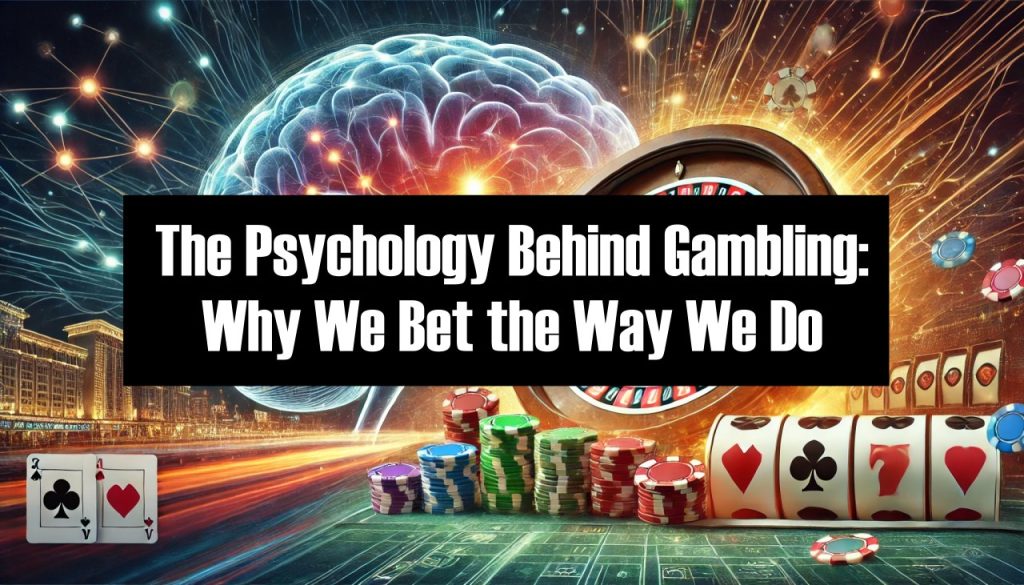Gambling is a global phenomenon that transcends cultures, languages, and socioeconomic classes. Millions of people play games of chance every day anywhere, from luxurious casinos in Las Vegas to online betting platforms. However, what forces this universal attraction? And why do people take out their hard-earned money with the hope that it will change into nothing more than an uncertain outcome?
The psychology of gambling demonstrates that there is a wonderful overlap between human behavior, cognitive biases and emotional triggers. Here it’s not about being lucky or skillful; it’s about why our brains evolved to pick up on uncertainty, risk, and reward.
The Allure of Gambling
Gambling holds a magnetic appeal that keeps players coming back. The blend of excitement, unpredictability, and potential for big rewards taps into primal instincts, making it an irresistible pastime for many.
The Thrill of Uncertainty
Are you fond of having that rush of adrenaline when you place a bet? Dopamine is a chemical the brain releases when it’s trying to get something you want it to do, you know, like pleasure. What makes the thrill of gambling is the unpredictability resulting from which outcome shows. Interestingly, the brain releases more dopamine in uncertain situations than when we get a guaranteed reward. As a result, risk taking is pleasurable inherently which is why some people like to gamble when the odds are always on their side.
The Appeal of Instant Gratification
On the flip side, gambling does not have to wait for feedback. Regardless of whether you win or lose, you have a great emotional roller coaster. A short term reward system can eclipse the larger potential long term consequences of this act, so the players feed on the high of ‘just one more try.’
Cognitive Biases in Gambling
In the high stakes gambling environment, cognitive biases unbalances our judgment. They could be to rational decisions or too much confidence.
The Gambler’s Fallacy
The gambler’s fallacy is the belief that past events affect future games. Say that a roulette wheel comes up black five times in a row, some might hold that red is ‘due.’ In actuality, the odds are the same and each spin is independent of the other. The fallacy is common, and it causes many players to make poor betting decisions that, in some cases, undermine their wins.
The Illusion of Control
An important part of the mythology that surrounds gambling is the belief that many gamblers can control outcomes with strategy or some kind of ritual such as blowing on dice or picking ‘lucky’ numbers. Some contain skill while the rest is random. And this illusion of control helps overconfident people make riskier bets.
Loss Aversion and Chasing Losses
Loss aversion is a concept, that humans are naturally more sensitive to losses than are equivalent gains. Such is also the case in gambling – ‘chasing losses’, as the players bet more hoping to recoup their losses. Unfortunately, this behaviour usually spirals out of control and finances and emotions become strained.
Psychological Triggers That Drive Gambling
Casinos and online platforms are designed to exploit psychological triggers that make gambling irresistible.
The Role of Near Misses
A near miss—like almost hitting the jackpot—can feel as rewarding as a win. This phenomenon keeps players engaged, as they believe they’re “close” to succeeding.
Slot machines frequently use near-miss outcomes to entice players into trying again.
Social Proof and Peer Influence
Gambling often thrives in social settings. Watching friends win or hearing stories of big jackpots can create a “fear of missing out” (FOMO). Group behavior normalizes gambling, making it more appealing to individuals who might not otherwise participate.
Advertising and Sensory Appeals
Bright lights, celebratory sounds, and immersive visuals create a sensory overload that enhances the gambling experience. Marketing campaigns further amplify this effect, portraying gambling as glamorous and rewarding, even when the reality may be quite different.
Addiction and the Cycle of Gambling
For some, gambling becomes more than a pastime—it becomes a compulsion that disrupts their lives.
How Gambling Hooks the Brain
Similarly, it’s the same dopamine pathways that make gambling feel good that result in addiction. This desensitization of the brain over time means that the brain needs to become oh sooo much more desensitized…to such a degree where stakes need to get higher and play sessions need to last longer before you even come close to the level of satisfaction. It’s all about this compulsion – reward cycle in gambling addiction.
The Emotional Impact of Gambling Addiction
Addiction is very emotionally draining. I hope many gamblers start to feel guilt, shame, and helplessness. As a result, it often leads to stress, anxiety, and depression and a cycle from which it is hard to break.
Breaking Free from the Addiction
Gambling addiction is a lot like addiction to any other drug in that in order to recover there are three very important factors at play: self awareness, professional advice, and a place of support. Those looking for recovery find that Cognitive-behavioral therapy (CBT) and support groups such as Gamblers Anonymous can be life changing.
Kesimpulan
Gambling an exhilarating and sophisticated pastime where we put our psychology to work, trading our thrill for risk and reward. While knowing what can cause some people to become addicted to gambling, can help you make better choices, it’s also important to remember to keep it fun, and within the rules of responsible gambling. Playing slots is for fun and should be enjoyed at its best rather than for money considerations.
Want to keep up with the best of the best when it comes to gaming experience? Get it now for the Kiss918 APK iOS! Kiss918 features numerous games, immersive graphics and simple interface to provide your gambling experience. Now, click here to start playing under our supervision and play responsibly anytime, anywhere!
